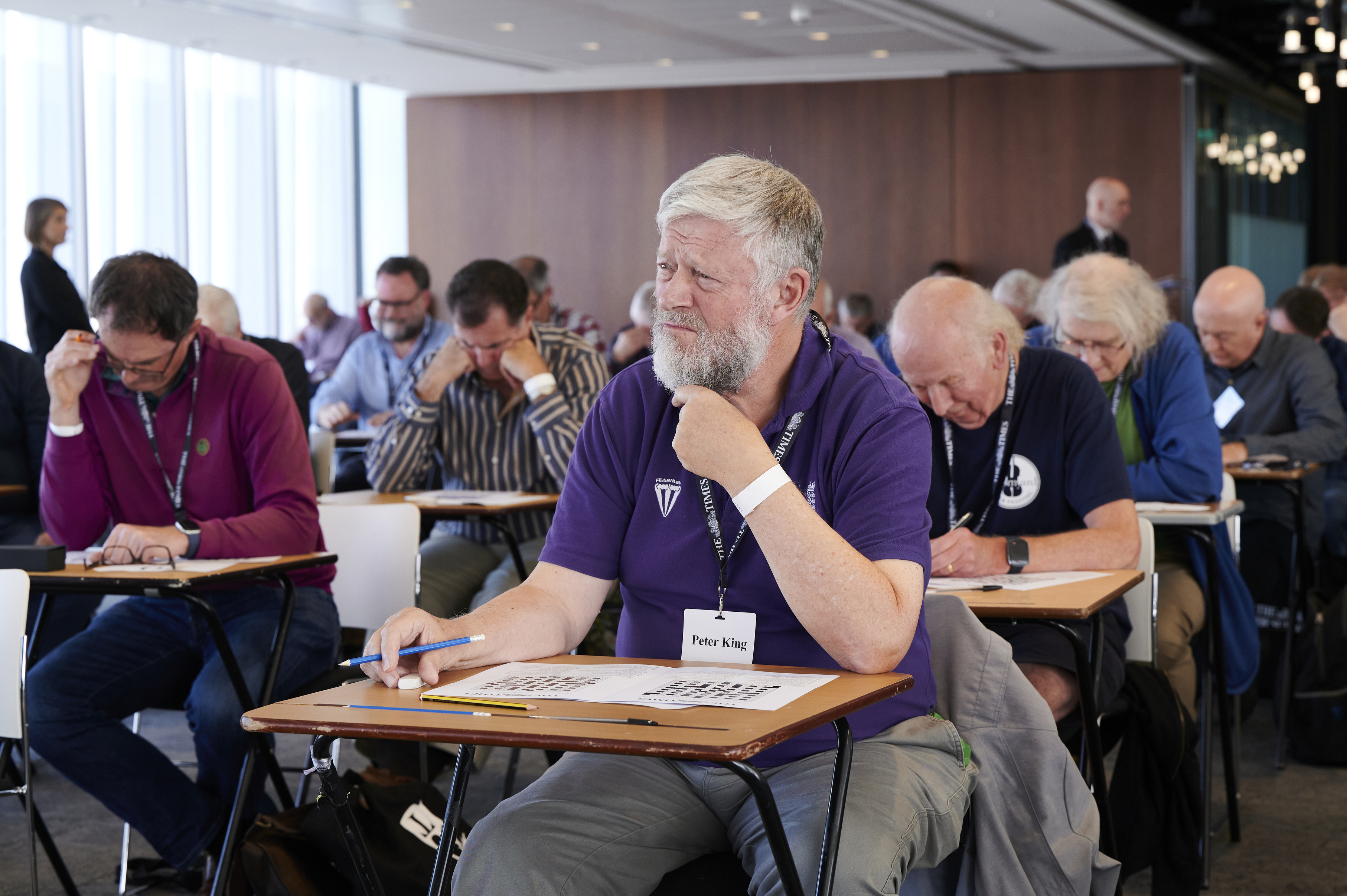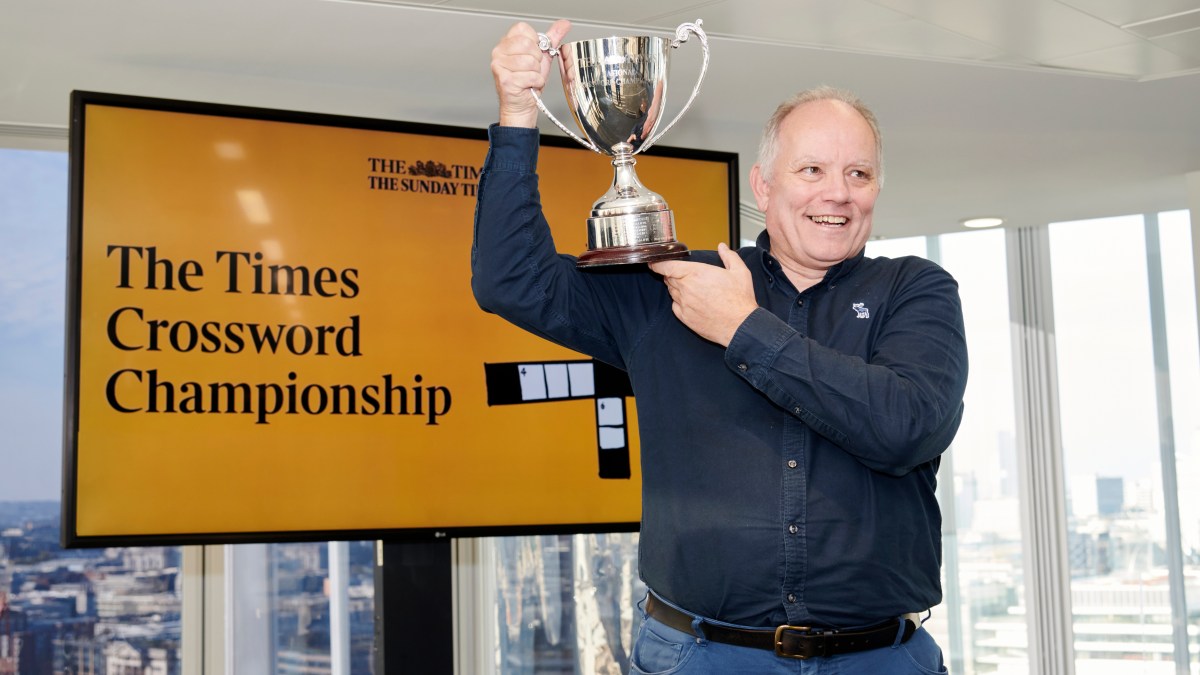There is no stopping Mark Goodliffe, it seems, but the dawn of AI means The Times crossword champion was pushed to his limits by specially trained cryptic crossword software.
Goodliffe, 60, a former financial director, retained his title on Saturday, solving the final puzzle in under nine minutes, more than four minutes ahead of his nearest rival.
But also pitting its wits (if that is the right word) against the puzzles was a specialist artificial intelligence program that has come closer than any other to cracking the cryptic crossword mindset.

The Times welcomed 110 competitors to solve three rounds of three puzzles
STEWART WILLIAMS
Professor Siddhartha Chatterjee, a computer scientist at the University of Texas, brought his creation, Darmok, over on his laptop for the event after a summer of intensive training.
Darmok solved two of the three semi-final puzzles in an impressive seven minutes but came unstuck on the third. Faced with the final puzzle, the program put up a performance that would have earned a human contestant fourth place but gave up after 18 minutes with one clue left — 24 down, if you want to see whether you can do better.
Try your hand at the final championship puzzle here.
Chatterjee, who created the program only four months ago with Nick Tomlin of New York University, said it was based on the latest ChatGPT model, GPT-5 ,but with further prompts. He described it as “a reasoning model” which goes through a chain of logic to get to the answer.
Speaking after the event, Chatterjee said that they would keep refining the model and hope to return next year.
“Teaching an AI program to solve cryptic crosswords was one of those things I always thought must be impossible, so I had to try it,” he said.
This year’s title was Goodliffe’s 14th in 26 years — more than the number of Premier League titles Sir Alex Ferguson won with Manchester United over a similar period.
Goodliffe regained the championship a year ago from Matthew Marcus and was not going to relinquish it again, finishing first in all three rounds.
• Test your brain with The Times’ daily puzzles
“The puzzles were especially difficult this year, and a lot of us competitors felt rather shell-shocked after each round,” Goodliffe said.
“Although the clues were consistently brilliant, the disguise was so good in so many of them that every one presented a real challenge. The vocabulary got a little extreme too — if I ever hear about a heresiarch [originator of a heresy] having a problem with tocopherol [a common form of vitamin E], I’ll have some idea what that means!”
From the outset the puzzles proved tricky, with most of the 110 competitors failing to finish all three in the qualifying round. Those who got most answers correct had to tackle three more puzzles in the semi-final, with the top five then going through to the final.
Three of the finalists were past champions: this year’s runner-up Roger Crabtree won in 2018, third-placed Marcus won in 2023 and fourth-placed David Howell clinched the title back in 1997, in the pre-Goodliffe era. Chloe Hutton, who was runner-up to Goodliffe last year, came fifth.
The other trophy awarded on the day came as a pleasant surprise to its recipient. Craig Fothergill came 66th in the qualifier and narrowly missed out on qualifying for the semi-final but won the Richard Rogan Prize for best-placed newcomer, introduced last year to encourage new entrants.

Craig Fothergill
STEWART WILLIAMS
“I completed about two and a half of the three qualifying puzzles, and I was under the impression that lots of people would complete all three,” he said. “As it turned out only ten solvers managed that.”
In preparation for the contest, Fothergill set out to solve as many Times crosswords as he could this year.
“I’ve been a cryptic solver for a long time but speed solving is a different game, and I was surprised at how much I improved over the course of one year,” he said.
Enthusiasts hope cryptic crosswords will prove to be one of the last bastions of human ingenuity that cannot be mastered by AI.
Many clues work like equations, with certain words indicating an anagram or that one word goes inside another. But solvers also need to exercise a degree of lateral thinking, and unravel punning cryptic definitions that are harder to reduce to crackable code.
However, every year the crossword’s equivalent of Deep Blue is coming closer. IBM’s supercomputer defeated the chess grandmaster Garry Kasparov in 1997, two years before Mark Goodliffe won his first crossword championship.
Now the question is who can beat Goodliffe — will it be a fellow human or an AI challenger?
Mick Hodgkin is puzzles editor

